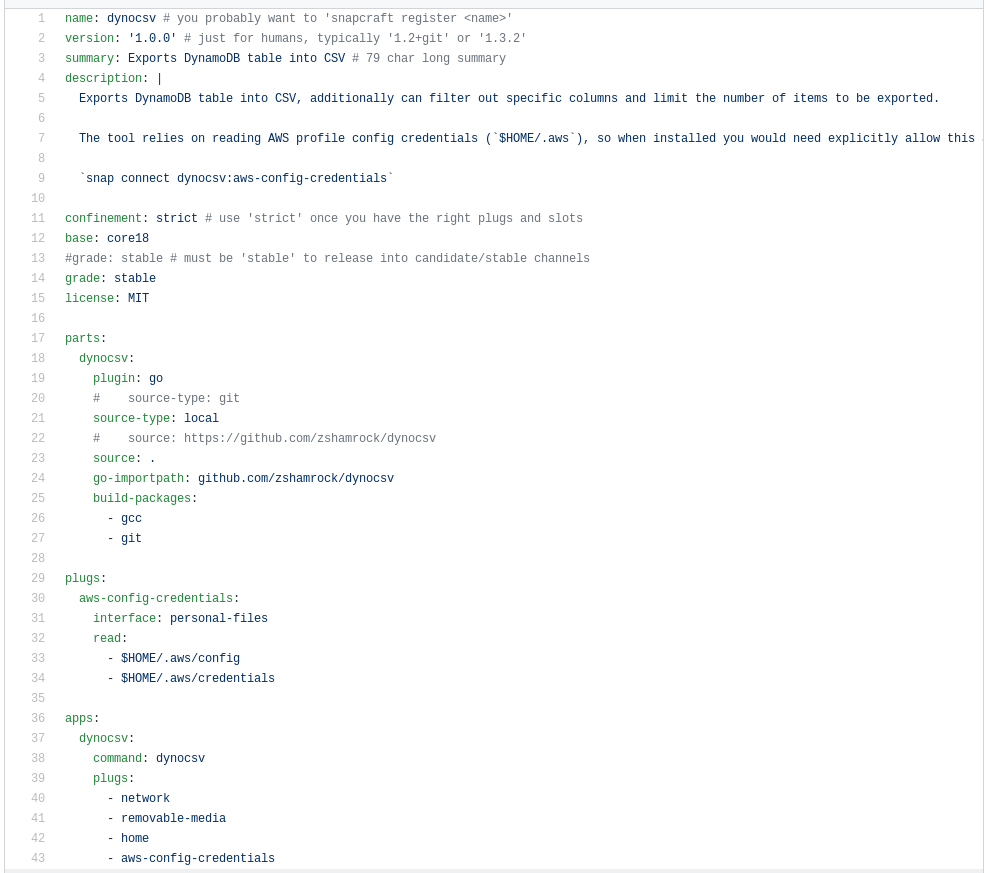Building SNAP
In my spare, I develop open-source tools for various topics. Mainly the tools which support the project I am working on. Depends on the type of tool there are different distribution strategies.
One of the distribution options is to build and publish the snapcraft.
Documentation is relatively good, but not complete, and not always up to date, so below is the up to date (at the moment of writing) snap declaration and building.
snapcraft.yaml
Here is the functional snapcraft.yaml for building a local Go application:

On Debian
$ snap debug confinement
partial
$ snap debug sandbox-features
apparmor: kernel:caps kernel:domain kernel:file kernel:mount kernel:namespaces kernel:network_v8 kernel:policy kernel:ptrace kernel:query kernel:rlimit kernel:signal parser:unsafe policy:downgraded support-level:partial
confinement-options: classic devmode
dbus: mediated-bus-access
kmod: mediated-modprobe
mount: freezer-cgroup-v1 layouts mount-namespace per-snap-persistency per-snap-profiles per-snap-updates per-snap-user-profiles stale-base-invalidation
seccomp: bpf-actlog bpf-argument-filtering kernel:allow kernel:errno kernel:kill_process kernel:kill_thread kernel:log kernel:trace kernel:trap
udev: device-cgroup-v1 tagging
From the above output, even the strict confinement is declared in the snapcraft.yaml Debian 10 (at the moment of writing) only supports partial implementation of the confinement (support-level: partial), and only 2 confinement-options: classic devmode.
So when you install the snap locally snap install --dangerous dynocsv_1.0.0_amd64.snap, and run it, it will work fine without any issues, which give the false sense of correctness of your snapcraft.yaml. So you always need to test on the system which has full confinement support.
On Ubuntu
Below commands are running on AWS EC2 Ubuntu 18.04.2 LTS instance (ami-09ca8a080b6699260).
$ snap debug confinement
strict
$ snap debug sandbox-features
apparmor: kernel:caps kernel:dbus kernel:domain kernel:file kernel:mount kernel:namespaces kernel:network kernel:policy kernel:ptrace kernel:query kernel:rlimit kernel:signal parser:unsafe policy:default support-level:full
confinement-options: classic devmode strict
dbus: mediated-bus-access
kmod: mediated-modprobe
mount: freezer-cgroup-v1 layouts mount-namespace per-snap-persistency per-snap-profiles per-snap-updates per-snap-user-profiles stale-base-invalidation
seccomp: bpf-actlog bpf-argument-filtering kernel:allow kernel:errno kernel:kill_process kernel:kill_thread kernel:log kernel:trace kernel:trap
udev: device-cgroup-v1 tagging
And here the full confinement support is enabled (support-level: full), and all 3 confinement-options: classic devmode strict are enabled. So if you install the above snap on this instance, it will fail, as expected.
Manually connect the plug
$ snap connections
Interface Plug Slot Notes
home dynocsv:home :home -
network dynocsv:network :network -
$ snap connections dynocsv
Interface Plug Slot Notes
home dynocsv:home :home -
network dynocsv:network :network -
personal-files dynocsv:aws-config-credentials - -
removable-media dynocsv:removable-media - -
home and network connections (also called as plugs or interfaces) are connected automatically by default. Which is not the case for the personal-files connection, which has the corresponding alias/plug: aws-config-credentials as per personal-files interface documentation, and has to be connected manually:
$ sudo snap connect dynocsv:aws-config-credentials
And now:
$ snap connections dynocsv
Interface Plug Slot Notes
home dynocsv:home :home -
network dynocsv:network :network -
personal-files dynocsv:aws-config-credentials :personal-files manual
removable-media dynocsv:removable-media - -
See "Notes: manual" for that personal-files interface.
Now if you run the app everything will work as expected.
The use of the personal-files interface also requires the approval, so store-requests ticket has to be created on the snapcraft forum.